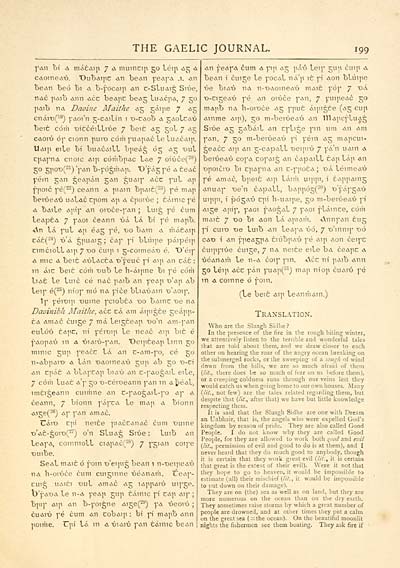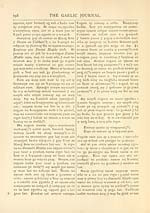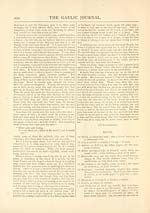Download files
Complete book:
Individual page:
Thumbnail gallery: Grid view | List view

THE GAELIC JOURNAL.
199
■pAii bi A niÁCAtn 7 Ok iini)nci]\ 50 léi|i aj^ a
CAOineẃ-ó. 'OubAi]ic An beAn ■|:eA]'A .1. An
bcAn beo bi a b-focAip An c-SluAij Snie,
nAC |iAib Ann acc beA]\c beAg U)ac]\a, 7 50
HAib nA Daoine Maithe aj sa'^s 7 aj
cnÁit)(^9) jTAorn j-CAiti'n 1 ■o-rAob a jAolcAt)
beic com -oiccéiLb'óe 7 beic aj jot 7 aj
CA01Ó Ó]' cionn iiuit) colli ]'UA]\Ac leluo.CAin.
tlAt]! eile bi buACAill ^iieAj 05 aj -out
cjiApiA cnoic Ai|i coiiibpAc l,Ae 7 oi-òce(-'')
50 5not)(-i) 'j.j^,-, b-pojiiiAn. "O'fÁj ]-é A ceAC
■pein gAn jeAjiÁn jAn jUAi]' acc fii'L a]\
fHOic ]"é(") ceAnn a ]nAin b)(Aic(-^) ]'é \wò.\\
beiueATD uaLac cjiom aji a cjioiue ; cÁinic ]'é
A bAite ApY An oit)ce-fAn ; img \é cum
teApcA 7 iTAOi ceAnn •ÓÁ lÁ bí ]'é 111 Apb.
-An tÁ i'ut A]\ éAg ]'é, X)0 hww a iíiácaiji
cÁc(-*) ló'Á jpuAij ; CA)' I'l bUii]\e pÁipéi)\
cnrciolt Ai]\ 7 '00 cui]! 1 5-coimeÁt) é. "O'éip
A mic A beic a-óIacca n'i'euc ]"i aiji An cÁc :
in Áic beiè cótii -oub le Vi-Áijine bi pé cóiii
1,1 AÈ le tuic cé nAC ]iAib An feA]\ ü'aji Ab
teif é(2^) nioj' mó nA p'ce bliADAin o'Aoip
1)' i:éiT)t]i tiume -pciobcA no bAinc tie nA
Daoinibk Âíaithe, acc cá aiii Áiinjce jeÁmi-
CA AiiiAc cuige 7 mÁ leijceAp ■oo'n Am-j-An
eiilót) cApc, ni iréfoip te neAC Ati\ bit é
■|-AO)iA-ó in A ■óiAi-ó-]'An. "OeijiceAji linn 50
ininic ^11)1 -j-eAcc lÁ An c-Ain-^'o, cé 50
n-Ab)\AiD- A lÁn ■OAoineAW 511)1 Ab 50 u-ci
An CI1ÁC A bl,A]-CA)i biAX) An c-j-aojaiI eile,
7 cotii liiAc a']' 50 -o-ceiTDeAnn ]'An in a JpéAl,
imcijeAnii cuimne ah c-]-ao5AiI-i'o a]' a
ceAnn, 7 bionn ]-Á]'ca le iiia]i a bionn
Ai5e(-^) Af I'An Am AC.
ÜÁiü z\\\ neice iHAcrAiiAC cum ■ouine
•o'ac-joiüC-") o'n SluAJ Slue: luib ah
leApA, coinnioll ctA)iAc(-^) 7 ygiAn coij-e
"ouibe.
ScaI mAic Ó ]"oin u'eiinj beAn 1 n-T)ei)ieAt)
nA h-oit)ce cum cuiginne -oeAnAiii. UeA]--
CUI5 UAICI tiul AtTIAC Ag 1A]1|1A1-Ò Ul^'je.
b'i.-AüA le ii-A T-'eAji 5U)i cÁinic ]-í ca]i Aif ;
b]\i]' Ai)i An b-jToigne Ai5e(^) yA •óeoib ;
cuAi"ò yé cum An cobAi)i : bi p niAjib Ann
]\oiẃe. ü)ií lÁ in A ■òiAiü ]'An cÁinic beAn
An ỳeAfA cum a p]i aj ]iá-ô leip jun cuip a
beAn 1 cutje le yocAl nÁ']\ ic p Aon blúipe
be biAD tiA ivoAoineAt) hiaic \ó\- 7 'o--^
o-cijeAb i'é An oibce ]v\n, 7 yuiiieAC 50
mA|ib nA 1i-oit)ce A5 ppuc Aijujce (aj cup
Ainme aiji), 50 m-beibeAW An lllAjiq-luAJ
Sibe Aj jAbÁil An cflije pin um An Ain
pAn, 7 50 m-beibeAD pi péin aj mApcui-
jeACc Aip All 5-cApAll TDeipib 7 pÁ'n UAin a
beibeAu coj'a coj'aij ah CApAill ca)i lÁp ah
x)poicit) bi cjiApuA An c-ppocA ; nA léimeAü
pé AmAc, b]ieic Aip lÁnii uijipi, i cApjiAing
AnuAp ■oe'n CApAll, bA)ipÓ5(3'') D'pÁpgAb
uipjii, 1 pójAü cpi b-UAi]ie, 50 m-beibeAb pi
Aige A)iip, pAOi pAOJAl 7 pAoi plÁince, cóiii
niAic 7 ■00 bi Aon lÁ ApiAiii. -dnnpAn cuj
pi cuit> Tie luib All leApA bo, 7 u'lnnip ■00
CAO i An p]ieA5]iA ciiibpAb pé ai]i Aon ceipc
cuippibe cuije, 7 nA neice eile bA ceA]\c a
•óéAnAiii le n-A coip pin. Acc ni ]\Aib Ann
50 léip ACC pÁn puAii(''i) iiiAp niop cuAib pé
in A coinne ó pom.
(Le beic Aip leAiiiiiAin.)
Translation.
Who are the Shiagh Sidhe?
In the presence of the fire in the rough biting winter,
we attentively listen to the terrible and wonderful tales
that are told about them, and we draw closer to each
other on hearing the roar of the angry ocean breaking on
the submerged rocks, or the sweeping of a sough of wind
down from the hills, we are so much afraid of them
(///., there does be so much of fear on us before them),
or a creeping coldness runs through our veins lest they
would catch us when going home to our own houses. Many
(/;'/., not few) are the tales related regarding them, but
despite that (Hi., after that) we have but little knowledge
respecting them.
It is said that the Sluagh Sidhe are one with Dream
an Uabhair, that is, the angels who were expelled God's
kingdom by reason of pride. They are also called Good
People. I do not know why they are called Good
People, for they are allowed to work both ^ood and evil
(lit., permission of evil and good to do is at them), and I
never heard that they do much good to anybody, though
it is certain that they work great evil (/;/., it is certain
that great is the extent of their evil). Were it not that
they hope to go to heaven, it would be impossible to
estimate (all) their mischief (///., it would be impossible
to put down on their damage).
They are on (the) sea as well as on land, but they are
more numerous on the ocean than on the dry earth.
They sometimes raise storms by which a great number of
people are drowned, and at otiier times tliey put a calm
on the great sea ( = the ocean). On the beautiful moonlit
nights the fishermen see them boating. They ask fire if
199
■pAii bi A niÁCAtn 7 Ok iini)nci]\ 50 léi|i aj^ a
CAOineẃ-ó. 'OubAi]ic An beAn ■|:eA]'A .1. An
bcAn beo bi a b-focAip An c-SluAij Snie,
nAC |iAib Ann acc beA]\c beAg U)ac]\a, 7 50
HAib nA Daoine Maithe aj sa'^s 7 aj
cnÁit)(^9) jTAorn j-CAiti'n 1 ■o-rAob a jAolcAt)
beic com -oiccéiLb'óe 7 beic aj jot 7 aj
CA01Ó Ó]' cionn iiuit) colli ]'UA]\Ac leluo.CAin.
tlAt]! eile bi buACAill ^iieAj 05 aj -out
cjiApiA cnoic Ai|i coiiibpAc l,Ae 7 oi-òce(-'')
50 5not)(-i) 'j.j^,-, b-pojiiiAn. "O'fÁj ]-é A ceAC
■pein gAn jeAjiÁn jAn jUAi]' acc fii'L a]\
fHOic ]"é(") ceAnn a ]nAin b)(Aic(-^) ]'é \wò.\\
beiueATD uaLac cjiom aji a cjioiue ; cÁinic ]'é
A bAite ApY An oit)ce-fAn ; img \é cum
teApcA 7 iTAOi ceAnn •ÓÁ lÁ bí ]'é 111 Apb.
-An tÁ i'ut A]\ éAg ]'é, X)0 hww a iíiácaiji
cÁc(-*) ló'Á jpuAij ; CA)' I'l bUii]\e pÁipéi)\
cnrciolt Ai]\ 7 '00 cui]! 1 5-coimeÁt) é. "O'éip
A mic A beic a-óIacca n'i'euc ]"i aiji An cÁc :
in Áic beiè cótii -oub le Vi-Áijine bi pé cóiii
1,1 AÈ le tuic cé nAC ]iAib An feA]\ ü'aji Ab
teif é(2^) nioj' mó nA p'ce bliADAin o'Aoip
1)' i:éiT)t]i tiume -pciobcA no bAinc tie nA
Daoinibk Âíaithe, acc cá aiii Áiinjce jeÁmi-
CA AiiiAc cuige 7 mÁ leijceAp ■oo'n Am-j-An
eiilót) cApc, ni iréfoip te neAC Ati\ bit é
■|-AO)iA-ó in A ■óiAi-ó-]'An. "OeijiceAji linn 50
ininic ^11)1 -j-eAcc lÁ An c-Ain-^'o, cé 50
n-Ab)\AiD- A lÁn ■OAoineAW 511)1 Ab 50 u-ci
An CI1ÁC A bl,A]-CA)i biAX) An c-j-aojaiI eile,
7 cotii liiAc a']' 50 -o-ceiTDeAnn ]'An in a JpéAl,
imcijeAnii cuimne ah c-]-ao5AiI-i'o a]' a
ceAnn, 7 bionn ]-Á]'ca le iiia]i a bionn
Ai5e(-^) Af I'An Am AC.
ÜÁiü z\\\ neice iHAcrAiiAC cum ■ouine
•o'ac-joiüC-") o'n SluAJ Slue: luib ah
leApA, coinnioll ctA)iAc(-^) 7 ygiAn coij-e
"ouibe.
ScaI mAic Ó ]"oin u'eiinj beAn 1 n-T)ei)ieAt)
nA h-oit)ce cum cuiginne -oeAnAiii. UeA]--
CUI5 UAICI tiul AtTIAC Ag 1A]1|1A1-Ò Ul^'je.
b'i.-AüA le ii-A T-'eAji 5U)i cÁinic ]-í ca]i Aif ;
b]\i]' Ai)i An b-jToigne Ai5e(^) yA •óeoib ;
cuAi"ò yé cum An cobAi)i : bi p niAjib Ann
]\oiẃe. ü)ií lÁ in A ■òiAiü ]'An cÁinic beAn
An ỳeAfA cum a p]i aj ]iá-ô leip jun cuip a
beAn 1 cutje le yocAl nÁ']\ ic p Aon blúipe
be biAD tiA ivoAoineAt) hiaic \ó\- 7 'o--^
o-cijeAb i'é An oibce ]v\n, 7 yuiiieAC 50
mA|ib nA 1i-oit)ce A5 ppuc Aijujce (aj cup
Ainme aiji), 50 m-beibeAW An lllAjiq-luAJ
Sibe Aj jAbÁil An cflije pin um An Ain
pAn, 7 50 m-beibeAD pi péin aj mApcui-
jeACc Aip All 5-cApAll TDeipib 7 pÁ'n UAin a
beibeAu coj'a coj'aij ah CApAill ca)i lÁp ah
x)poicit) bi cjiApuA An c-ppocA ; nA léimeAü
pé AmAc, b]ieic Aip lÁnii uijipi, i cApjiAing
AnuAp ■oe'n CApAll, bA)ipÓ5(3'') D'pÁpgAb
uipjii, 1 pójAü cpi b-UAi]ie, 50 m-beibeAb pi
Aige A)iip, pAOi pAOJAl 7 pAoi plÁince, cóiii
niAic 7 ■00 bi Aon lÁ ApiAiii. -dnnpAn cuj
pi cuit> Tie luib All leApA bo, 7 u'lnnip ■00
CAO i An p]ieA5]iA ciiibpAb pé ai]i Aon ceipc
cuippibe cuije, 7 nA neice eile bA ceA]\c a
•óéAnAiii le n-A coip pin. Acc ni ]\Aib Ann
50 léip ACC pÁn puAii(''i) iiiAp niop cuAib pé
in A coinne ó pom.
(Le beic Aip leAiiiiiAin.)
Translation.
Who are the Shiagh Sidhe?
In the presence of the fire in the rough biting winter,
we attentively listen to the terrible and wonderful tales
that are told about them, and we draw closer to each
other on hearing the roar of the angry ocean breaking on
the submerged rocks, or the sweeping of a sough of wind
down from the hills, we are so much afraid of them
(///., there does be so much of fear on us before them),
or a creeping coldness runs through our veins lest they
would catch us when going home to our own houses. Many
(/;'/., not few) are the tales related regarding them, but
despite that (Hi., after that) we have but little knowledge
respecting them.
It is said that the Sluagh Sidhe are one with Dream
an Uabhair, that is, the angels who were expelled God's
kingdom by reason of pride. They are also called Good
People. I do not know why they are called Good
People, for they are allowed to work both ^ood and evil
(lit., permission of evil and good to do is at them), and I
never heard that they do much good to anybody, though
it is certain that they work great evil (/;/., it is certain
that great is the extent of their evil). Were it not that
they hope to go to heaven, it would be impossible to
estimate (all) their mischief (///., it would be impossible
to put down on their damage).
They are on (the) sea as well as on land, but they are
more numerous on the ocean than on the dry earth.
They sometimes raise storms by which a great number of
people are drowned, and at otiier times tliey put a calm
on the great sea ( = the ocean). On the beautiful moonlit
nights the fishermen see them boating. They ask fire if
Set display mode to: Large image | Transcription
Images and transcriptions on this page, including medium image downloads, may be used under the Creative Commons Attribution 4.0 International Licence unless otherwise stated. ![]()
| Early Gaelic Book Collections > Blair Collection > Gaelic journal > Volume 4, number 33 > (199) |
|---|
| Permanent URL | https://digital.nls.uk/79326887 |
|---|
| Description | No. 33, Vol. IV. 1889. |
|---|---|
| Shelfmark | Blair.217 |
| Attribution and copyright: |
|
| Description | A selection of books from a collection of more than 500 titles, mostly on religious and literary topics. Also includes some material dealing with other Celtic languages and societies. Collection created towards the end of the 19th century by Lady Evelyn Stewart Murray. |
|---|
| Description | Selected items from five 'Special and Named Printed Collections'. Includes books in Gaelic and other Celtic languages, works about the Gaels, their languages, literature, culture and history. |
|---|

